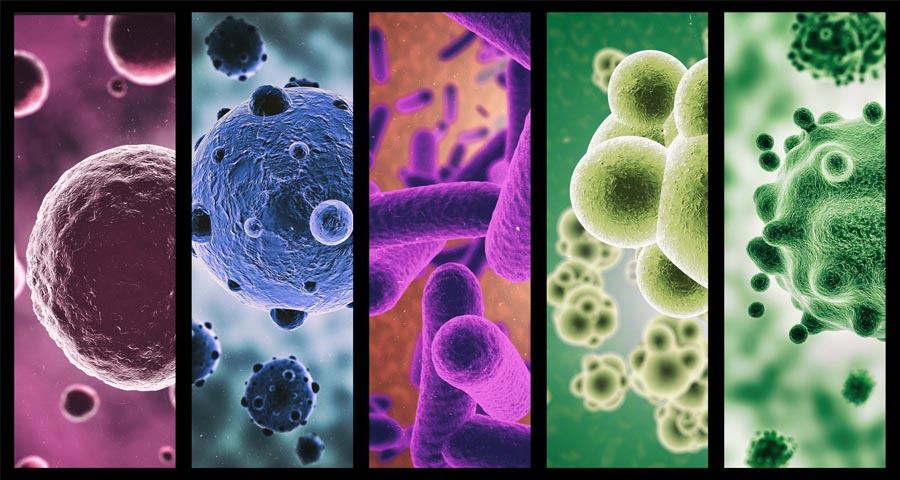Stop the Spread of Germs
Stopping the spread of germs is essential for maintaining a healthy environment. Germs can easily be transmitted from person to person, spreading illnesses such as the common cold and flu. By understanding how they are spread and implementing proper hygiene practices, we can minimize the risk of infection. Here are some key ways to stop the spread of germs:
- Use effective hand hygiene techniques.
- Regularly clean high-touch surfaces and objects.
- Practice good food safety hygiene techniques.
- Stay home when you are sick.

By following these practices, we can effectively stop the spread of germs and create a healthier environment for everyone. Proper hygiene is a crucial step in preventing the spread of illness and maintaining overall well-being. Keep reading for tips, techniques, and products that you can use to help prevent the spreading of germs in your facilities.
What are germs?

Germs are microscopic organisms that can cause infections and diseases. They can be bacteria, viruses, fungi, or protozoa. While not all germs are harmful, some can threaten our health. We encounter them daily through contact with people, objects, or contaminated surfaces. Understanding what germs are and how they spread is crucial for preventing the transmission of illnesses. Here are some essential things to know about them:
- Germs can survive on surfaces for varying lengths of time, depending on the type and environmental conditions.
- There are different types of germs, including bacteria, viruses, fungi, and protozoa, each with its own characteristics and mechanisms of infection.
- Common types of germs that cause illnesses include respiratory viruses like the common cold and flu and bacteria like E. coli and Salmonella.
- Germs can be transmitted through direct contact with an infected person, indirect contact with contaminated objects or surfaces, or through droplets in the air from a cough or sneeze.
- Basic hygiene practices, such as proper handwashing, cleaning and disinfecting surfaces, and practicing food safety, remove dirt and effectively prevent the spread of germs.
Why is it important to stop the spread of germs?
Stopping the spread of germs is crucial for maintaining a healthy environment and preventing illnesses and infections. When germs are allowed to proliferate and spread, they can lead to widespread outbreaks and put vulnerable individuals at risk. This affects individuals and puts a strain on healthcare systems and communities as a whole.
In addition to potentially harming individuals, outbreaks can increase employee absenteeism and can harm business operations. According to an article by the U.S. Chamber of Commerce Foundation, workers miss 111 million workdays yearly because of the flu. The ripple effect of these lost work days is estimated to cost the U.S. economy over $80 billion annually.
A two-pronged approach - Stop spreading your germs and keep others' germs away from you
In this section, we will discuss tactics and products you can use to try to break the chain of infection. Each of these ideas is either a way to prevent you from spreading germs or to prevent someone elses' germs from infecting you. In some cases, like hand washing, it's a way to prevent both spreading and infection.
By taking simple yet effective measures, we can actively reduce the transmission of harmful pathogens and ensure the health and well-being of ourselves and those around us.

Proper Hand Hygiene
- Wash hands frequently with soap and warm running water for at least 20 seconds. Click here to see our collection of hand-washing-promoting posters you can download and print.
- Use hand sanitizers with at least 60% alcohol when soap and water are unavailable. Hillyard also offers an alcohol-free hand sanitizer.
- Avoid touching the face, especially the eyes, nose, and mouth.
- Cover coughs and sneezes with a tissue or the inside of the elbow.
Use Effective Hand Washing Technique
Washing your hands with soap and warm water is essential in preventing the spread of harmful germs. According to the World Health Organization (WHO), washing hands with soap and warm water for at least 20 seconds is the most effective way to remove contaminants from your hands. Follow these steps for the best results:
- Wet your hands under warm running water.
- Apply liquid soap to your hands.
- Lather the soap and rub your hands together for at least 20 seconds. Make sure to cover all surfaces of your hands, including your palms, fingers, and the backs of your hands.
- Rinse your hands thoroughly under running water.
- Dry your hands using a clean towel.
Proper handwashing helps remove various contaminants that can cause illnesses, such as the common cold, flu, and respiratory viruses. It is essential to wash your hands before eating, after using the restroom, and after coughing, sneezing, or blowing your nose to prevent infections.
Use paper towels to turn off faucets and open doors
Using paper towels to turn off faucets and open doors is essential in stopping the spread of germs. When we touch these high-touch surfaces, we can quickly transfer bacteria and other harmful microbes. Using disposable paper towels to turn faucet handles, open doors, and turn off light switches can reduce the risk of transferring bacteria and keep our hands clean and hygienic.
Use sanitizer if hand washing is not an option
Using hand sanitizer is a viable option for stopping the spread of germs. Hand sanitizers that contain at least 60% alcohol have been proven to reduce germs on the skin effectively.
Here are the proper steps to effectively use hand sanitizer:
- Apply a quarter-size drop of sanitizer to the palm of one hand.
- Rub your hands together, ensuring that you cover all surfaces, including the back of each hand and the fingertips.
- Continue rubbing for about 20 seconds or until the sanitizer has completely dried on your hands.
- Remember to pay extra attention to the areas between your fingers and under your nails.
Clean and Disinfect High-Touch Surfaces
- Regularly clean and disinfect frequently touched objects and surfaces, such as doorknobs, light switches, and remote controls.
- Use disinfectants that are effective against viruses and bacteria.
- Pay extra attention to shared spaces like kitchens, bathrooms, and common areas.
Practice Respiratory Etiquette
- Use disposable tissues for coughs and sneezes, and dispose of them properly.
- If no tissue is available, cough or sneeze into the elbow to avoid contaminating hands.
- Wear a mask in public settings, especially when social distancing is challenging.
Stay Home When Sick
- Avoid close contact with others if feeling unwell with symptoms like fever, cough, or sore throat.
- Seek medical advice and follow recommendations from healthcare professionals.
- Return to work or public spaces only when fully recovered and symptom-free.
- Encourage using sick day policies and flexible work schedules: The CDC recommends that employees with a fever stay away from work until the fever is gone for 24 hours. Workers with active flu symptoms are encouraged to stay away from work. Flexible work-from-home policies can help prevent the spread of illnesses from employees who are actively showing symptoms but still feeling well enough to work.
Maintain a Clean Environment and Follow Food Safety Guidelines
- Maintain clean and hygienic public spaces, including regularly cleaning floors and surfaces.
- Handle and store cooked and raw food properly to minimize the risk of foodborne illnesses.
- Follow best practices in food preparation, such as washing hands thoroughly before handling food and using separate utensils for raw and cooked foods.
Avoid Sharing Personal Items
One critical practice is to avoid sharing personal items. Germs have the potential to remain on surfaces for extended periods and can be easily spread through contact. Refraining from sharing personal items can reduce the risk of transferring harmful bacteria and viruses. Here are some examples of personal items that should not be shared:
- Straws and utensils: When we use items like straws or utensils, our mouths come into direct contact with them. Sharing these items can transfer saliva containing bacteria and viruses, increasing the likelihood of spreading illnesses.
- Respiratory equipment: In situations where respiratory equipment is needed, such as face masks or inhalers, individuals must have their own. Sharing these items can introduce germs to the respiratory system, potentially causing respiratory infections or other illnesses.
- Phones: Phones come into close contact with the face and mouth. If sharing is necessary, put the phone on speaker to avoid skin contact.
Hillyard Can Help You Stop the Spread of Germs
Don't settle for anything less than the best when it comes to stopping the spread of germs. Hillyard's premium hygiene products are designed to keep your building occupants safe and healthy. From hand sanitizers to disinfectants, our products are high quality and trusted by professionals.
Your local Hillyard representative can help you find the best hygiene products for your facility. Use the "I'm interested" form below, and we will contact you. With Hillyard's help, you can stock your facility with effective, cost-efficient hygiene solutions for deep cleaning, sanitization, and disinfection.
Resources
Download and print these documents:
Handwashing Posters
Pandemic Awareness Posters
Frequently Asked Questions
What are ways to protect yourself from germs?
Wash your hands regularly with soap and water for at least 20 seconds. This is especially important after using the restroom, before eating, and after being in a public place like a store or restaurant. Use hand sanitizer when hand washing isn't possible.
What is the most important factor in stopping the spread of germs?
The most important factor in stopping the spread of germs is regular and thorough handwashing. Washing hands with soap and water helps remove dirt, bacteria, and other germs that can cause illness. Additionally, using an alcohol-based hand sanitizer when soap and water are not available is also an effective way to kill germs on the hands.
How do you stop germs from spreading?
It is essential to practice good hygiene and follow a few simple steps. The first step in preventing the spread of germs is regular handwashing with soap and warm water. Washing your hands for at least 20 seconds with soap will help to remove germs from your skin. Also, cough or sneeze into your elbow to prevent droplets from entering the air. Finally, stay away from vulnerable people when you are sick.